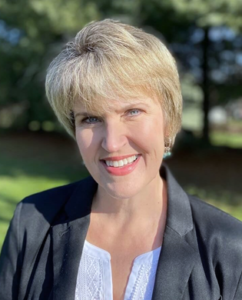Executive coaching may be one of the most underutilized tools that helps leaders reach their full potential. The practice is as unique as the coaches themselves. It involves a confidential relationship where the executive drives the agenda, and the coach provides structure, accountability, and a way to measure progress.
Kincannon & Reed would like to introduce two of our executive coaches and hear directly from them regarding why they invested in becoming certified and serving clients as an executive coach.
Sally Day — Ohio, United States

When I reflect on the question of what drew me to become an executive coach, I believe that my entire career has led me to this path. I think of my career in three chapters. The first chapter is one in which I enjoyed a long career in procurement; 20-plus years working my way through roles of increasing responsibility in both plant operations and corporate roles. I was excited by the evolving nature of the profession and the people who I could mentor and help grow along the way.
The second chapter of my career was an unconventional move for a supply chain professional. One that was immensely rewarding and got me excited about people reaching their full potential – I was working on leadership development, career management, and organizational initiatives. It got me closer to my ideal self still within the confines of corporate life. It was during this chapter that I experienced working with a coach as part of an executive leadership program.
Agriculture and food are made up of some of the most sincere, humble and uniquely talented leaders who are trying to do the right thing every day.
Sally Day
Having worked my entire career in traditional food CPG companies, I survived countless acquisitions, divestitures, mergers, optimizations, and transformations. It seemed that the universe was talking to me when my role was collapsed with another senior leader’s role, and I found myself without a seat in a game of corporate musical chairs. What to do after nearly 30 years in corporate life? It was time to dream.
Enter chapter three. It didn’t take me long to realize my calling and I use the word “calling” deliberately. I looked for the next chapter in my career to blend my larger purpose and unique gifts into my work. I set out to educate myself in the profession of coaching through the prestigious Gestalt Institute of Cleveland and turn my dream of coaching and mentoring into a reality. My journey has been both professional and personal. Any coach would tell you that being a coach means being all in.
Fast forward several years and you may be curious about how it’s going.
I joined Kincannon & Reed, a professional global executive search firm specializing in food and agribusiness. I consider it my privilege to be coaching some of the industry’s key leaders. Agriculture and food are made up of some of the most sincere, humble, and uniquely talented leaders who are trying to do the right thing, every day. Imagine, bearing witness to a leader who is realizing their greatness before your own eyes or struggling with a difficult decision that hurts their heart. The conversations are real and deep. That is what coaching at Kincannon & Reed is about; it’s what keeps me coming back every day. It’s about helping leaders grow and the world needs great leaders.
Michael Whitney — Malton Yorkshire, United Kingdom

During my 35-year career in executive leadership roles in the food and agribusiness industries, as well executive search, I have worked with three executive coaches. One experience was memorable and two were not. The two which were not were early in my general management (GM) career. Human Resources decided it would be a good idea to support my professional development by pairing me with an executive coach. It was straight out of the HR playbook and was offered to every up-and-coming GM.
On paper, both my coaches were eminently qualified. Both were seasoned senior executives with 30 to 40 years of experience. They had impressive track records working for leading global consumer goods companies. However, as the sessions progressed, I became increasingly frustrated because I did not feel that I was being listened to. In fact, the opposite was true. When I described a situation, the coaches saw it as their role to take control, offer advice, and give their solutions.
One of the most widely cited definitions of executive coaching comes from Professor John Whitmore. He suggested coaching is about “unlocking a person’s potential to maximize their own performance. It is helping them to learn, rather than teaching them – a facilitation approach.” The section I have underlined resonates because this is what was missing from my experience with both individuals. They excelled as business mentors but failed as coaches.
The third coaching experience was the polar opposite. A friend shared his experiences working with an executive coach and goaded me to give it another shot. Suitably chastened, I contacted his coach and she consented to a one-hour pro bono session.
Coaching is about “unlocking a person’s potential to maximize their own performance. It is helping them to learn, rather than teaching them – a facilitation approach.”
Michael Whitney
Initially, I was guarded, but as we got deeper into the session, I opened up. Focusing on a business issue that I chose, my coach’s questions were open, succinct and challenging. They forced me to reflect and explore how I responded to the situation. The session ended with a call to action with my coach asking me, “… what have you learned about yourself, what changes are you going to make and how are you going to hold yourself accountable?”
The experience was hugely energizing because she gave me the time and space to think and speak. As Nancy Kline says at the opening to her excellent book Time to Think, my coach created “A Thinking Environment… a set of conditions [that made]it possible for [me] to move further, go faster, plumb insights, banish blocks, and produce brand-new, exactly needed ideas in record time.” My coach was non-judgmental, but when she saw inconsistencies or felt I was holding back, she challenged me to go deeper and step outside my comfort zone. I was so impressed that we worked together for over a year until she moved overseas.
My third coaching experience convinced me that executive coaching can be transformative. My professional coaching studies and work with clients have reinforced my belief that personal development does not stop just because someone has a seat at the top table. It’s rare that senior leaders have time to really pause, reflect and develop new insights about themselves. Executive coaching is a tool that can facilitate this. It gives senior executives time to think and explore issues important to them in a safe, confidential, and non-judgmental environment. That’s why I became an executive coach and why I keep coaching.
Kincannon & Reed Executive Coaching
Research has shown executive coaching helps leaders accelerate transitions, become more solution-focused, collaborative and results-driven. To learn more about Kincannon & Reed’s Executive Coaching Services, please contact us at KRCoach@KRSearch.net.